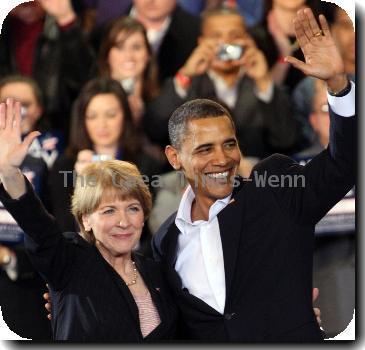A royal widow jousts with the ‘realists’ over nukes, on a long road toward zero bombs
By Charles J. Hanley, APSaturday, April 17, 2010
A royal widow takes on the ‘realists’ over nukes
McLEAN, Va. — Tweeting, Skyping and blogging on Huffington Post, holding forth on CNN or al-Jazeera, debriefing arms negotiators and parleying with generals, the queen is perfecting her nuclear strategy.
Her strategy is to get rid of them.
Noor al-Hussein, widowed queen of Jordan, the American beauty whose storybook romance with the late King Hussein captivated the world a generation ago, is now telling a story of nuclear calamity and how to avoid it, as co-leader and omnipresent voice for Global Zero, a growing movement crusading for abolition of atomic weaponry.
Her organization’s study commission of former missile commanders, foreign and defense secretaries, arms control specialists and others has proposed a step-by-step, 20-year plan for eliminating all nuclear arms — in the U.S., Russia, China, wherever.
“Realists” on the international scene might ask: Are you serious?
She is. She also sounds like a realist.
“We recognize it could take much longer, that it’s going to be a torturous road ahead,” she says.
The road thus far for the 2-year-old organization has been smooth and successful, judging from the impressive “who’s who” of world leadership climbing aboard its campaign wagon, some 200 names, from Mikhail Gorbachev and Jimmy Carter to a platoon of retired brass from the Pentagon and the Russian, Chinese and other militaries.
Global Zero scored a coup in February when George P. Shultz, President Ronald Reagan’s secretary of state, a gray eminence from the conservative heyday, took part in the organization’s Paris “summit.”
Noor said she is most encouraged by the new U.S.-Russian arms reduction treaty and other “historic steps” taken by Barack Obama and Dmitry Medvedev, who have jointly embraced a no-nukes goal. The Kremlin leader even works the term “global zero” into his rhetoric.
“It’s just so heartening to see the Russian and American presidents coming together and discussing these very difficult issues,” she told The Associated Press.
On this day, the second in last week’s two-day Washington summit on keeping nuclear material out of terrorists’ hands, a young campaigner delivered Global Zero’s declaration to the White House. Some 380,000 people worldwide have signed up online.
Five miles up the Potomac in woody McLean, meanwhile, Noor met with a reporter in her hillside compound of sumptuously furnished home and office. The Washington-born former Lisa Halaby was relaxed, gracious and elegant in a sheath dress of soft periwinkle blue — a star-quality presence that is helping raise the abolition movement’s profile.
She was also deeply engaged, tackling questions about the esoterica of the nuclear age with gusto, and with knowledge.
Now 58, a widow for more than a decade, her four children all grown and on their own, Queen Noor has clearly made it her mission to immerse herself in the world of doomsday arms, learning from such old hands as Reagan arms negotiator Richard Burt, her co-leader of Global Zero.
She takes the “realists” head on — “those locked into a Cold War thought process.”
“Many will react skeptically, in a black-and-white fashion, to what we’re saying, saying, ‘So, you want the United States to give up all its weapons like that?’ or, ‘You expect Russia to abandon its arsenals?
“No. It takes time,” she said. “It’s a step-by-step process and we have laid out the phases under which that needs to take place.”
That process was conceived by a study commission counting among its 23 members a former U.S. Atlantic Command chief, an ex-head of Russian strategic forces, and a retired Chinese military strategist, along with other military, political and scientific luminaries from seven nuclear powers, plus Japan and Germany.
Their plan calls for the U.S. and Russia to negotiate deeper bilateral cuts in their arsenals, to 1,000 warheads each by 2018. Meanwhile, beginning in mid-decade, all other nuclear-armed nations for the first time would enter multilateral talks to reduce their weapons in proportion to continuing U.S. and Russian cuts. All would reach zero by 2030.
The ambitious plan would require transparency, ironclad verification, no-notice, on-site inspections — an intrusiveness the nuclear powers might resist. It would also seem to require a great easing of tensions between nuclear-armed India and Pakistan, for example, and for nuclear-armed Israel.
Such factors make de-nuclearization unlikely for decades to come, many believe, among them apparently Obama, who says his no-nukes goal “will not be reached quickly — perhaps not in my lifetime.”
“I’m not discouraged,” Queen Noor said of the president’s statement. “But I don’t necessarily agree with him that it’s not possible to happen in his lifetime.”
Finding mechanisms for verifying and enforcing a world without atomic bombs will require lengthy, intense, detailed negotiations, she acknowledged. But already these things are being researched by a range of governments and think tanks, “not just Global Zero,” she said.
With diverse foundation funding led by Canada’s Simons Foundation, Global Zero looks like it’s in this high-stakes planetary debate for the long haul. So does Noor, a past activist in campaigns against land mines and cluster bombs who was recruited for leadership in 2008 by Global Zero co-founder Bruce Blair, a U.S. arms-control scholar.
“Wherever I can be useful to the movement, I’m there,” she said.
She and fellow campaigners place considerable hope in “Countdown to Zero,” a documentary film premiering in U.S. theaters July 9.
Noor said the movie, produced with Global Zero assistance, should help reach younger people who “probably haven’t even seen the images of Hiroshima and Nagasaki, and so they don’t have any sense of the reality of what this is.”
Global Zero: www.globalzero.org
“Countdown to Zero”: www.takepart.com/zero
Tags: Arts And Entertainment, Barack Obama, Celebrity, Eastern Europe, Europe, Mclean, North America, Russia, United States, Virginia, Weapons Administration





